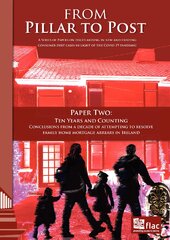‘Ten Years and Counting’ - FLAC paper examines the difficult question of family home mortgage arrears
18 August 2021

Today, the 18th of August, 2021, FLAC publishes the second of four papers in the series ‘From Pillar to Post’ which assess the difficulties facing consumer borrowers following the pandemic.
This paper, ‘Ten Years and Counting’ examines the difficult question of family home mortgage arrears, a problem that continues to have a massive impact on the lives of many Irish families in the aftermath of the economic crash of 2008. New mortgage arrears cases have arisen as a result of the pandemic and the withdrawal of Covid related income supports over time may give rise to further cases or deeper mortgage arrears for current borrowers. According to a recent paper from the CBI, a total of over 95,000 PDH (Private Dwelling House) mortgage accounts one in eight are forecast to have a ‘balance shortfall’ at the end of the mortgage term.
According to Paul Joyce, Senior Policy Analyst with FLAC and the main author of the series,
‘It is clear that the current system of resolution is not working effectively for borrower or lender, or indeed the taxpayer. Further mortgage arrears (and general personal insolvency) cases arising out of Covid 19 may present a significant challenge but they also present an opportunity. Apart from treating these new cases with the compassion and decisiveness they deserve, given that the ultimate event that gave rise to them - a global pandemic - is outside of the borrower’s control, there is an opportunity to re-examine the legacy cases in a more open and systemic way and to reach resolutions in as many cases as possible for once and for all.’
This paper examines in detail the mortgage arrears and restructures data published by the Central Bank of Ireland (CBI) over recent years. We conclude from this data that the resolution processes put in place following the Global Financial Crisis (GFC) and the subsequent legislative initiatives introduced to improve those processes have given lenders too much control over outcomes and have not delivered sustainable solutions for many borrowers.
The figures demonstrate that lenders have failed in many cases to take the opportunity presented by the Mortgage Arrears Resolution Process (MARP) of the Code of Conduct on Mortgage Arrears (CCMA) to put in place an affordable alternative repayment arrangement. For example, a substantial percentage of the borrowers currently in arrears who are deemed to be cooperating by their lender - around two in every three — have not been offered a restructure by their lender. In addition, the options provided to borrowers under the personal insolvency legislation have delivered insufficient numbers of legally binding arrangements, and recent reforms to the legislation concerning repossession remain unused.
‘There needs to be a re-examination of the role of the court system in mortgage arrears cases and a clear route for people to exit the resolution process system. In our view, recourse to the legal system in mortgage arrears cases should be a last resort. Passing a case onto the courts to deal with, even though the problem is usually not about determining legal right or wrong (the normal business of the courts), is indicative of a state failure to take responsibility for the outcomes of a lending model that facilitated reckless lending and ultimately failed many borrowers.’ – Paul Joyce, FLAC Senior Policy Analyst
In this Paper, FLAC makes 18 specific recommendations. These include the CBI improving lender reporting mechanisms in relation to all aspects of arrears and repossession data gathering and investigating apparent anomalies in the data provided by the lenders. It is also recommended that the CBI accompany its data releases with a commentary on the evolving debt situation post-Covid including what additional measures and supports are required. We also propose that the CBI and the Insolvency Service of Ireland (ISI) together provide more comprehensive data on the role of personal insolvency arrangements in mortgage arrears cases. Further substantive recommendations on law reform will be made in the final Paper Four in this series.
Pillar to Post Paper 2 is available to read or download at https://www.flac.ie/publications/flac-pillar-to-post-paper-2/
Overview of Pillar to Post series of papers:
· Paper One - Setting the Context: A critical examination of data relating to consumer debt, welfare, labour market and the economy
o The first paper will set the context for the discussion that is required by providing an overview of data on consumer debt at the point that Covid hit and by monitoring subsequent developments over the past 15 months, up to the announcement of the phasing out of the PUP payment.
o Pillar to Post Paper 1 is available to read or download at https://www.flac.ie/publications/flac-pillar-to-post-paper-one/
· Paper Two - Ten years and Counting: Conclusions from a decade of attempting to resolve family home mortgage arrears in Ireland
o The second paper will examine in considerable detail how attempts to resolve the mortgage arrears problem over the past decade have been, at best, partially successful and how an array of initiatives introduced at various stages have lacking coherency, from which many lessons can be learned.
o Pillar to Post Paper 2 is available to read or download at https://www.flac.ie/publications/flac-pillar-to-post-paper-2/
· Paper Three - Assessing current research data on the payment breaks on credit agreements offered by credit institutions as a result of the Covid 19 pandemic
o The third paper will examine the extent of payment breaks on loan agreements offered by a range of credit providers to consumers during the course of 2020 and what this indicates in terms of future indebtedness.
· Paper Four - A review of the Debt Resolution Mechanisms and the Support Services: With final recommendations for reform.
o The fourth paper will examine in detail the current infrastructure to assist borrowers to resolve over-indebtedness and will close by making final recommendations for reform.
#FlacPillarToPost
ENDS/